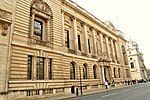Royal Institution of Chartered Surveyors

The Royal Institution of Chartered Surveyors (RICS) is a UK-based professional body for surveyors, founded in London in 1868. It works at a cross-governmental level, and aims to promote and enforce the highest international standards in the valuation, management and development of land, real estate, construction and infrastructure. Founded as the Institution of Surveyors, it received a royal charter in 1881, and in 1947 became the Royal Institution of Chartered Surveyors. With a London HQ and regional offices across the United Kingdom, plus international offices, it serves a 134,000-strong membership distributed over nearly 150 countries. The RICS is linked to other national surveying institutions, collaborates with other professional bodies, and, in 2013, was a founder member of a coalition to develop the International Property Measurement Standards (IPMS). It also produces cost information and professional guidance on valuation and other activities. In September 2021, an independent review exposed poor governance practices at the highest levels of the RICS organisation, prompting the resignations of the president, chief executive, interim chair of the governing council, and chair of the management board, in addition to the earlier resignation of the chief operating officer. The report was labelled an "appalling advert for our profession on the world stage".
Excerpt from the Wikipedia article Royal Institution of Chartered Surveyors (License: CC BY-SA 3.0, Authors, Images).Royal Institution of Chartered Surveyors
Great George Street, London Millbank
Geographical coordinates (GPS) Address Nearby Places Show on map
Geographical coordinates (GPS)
| Latitude | Longitude |
|---|---|
| N 51.500833333333 ° | E -0.12805555555556 ° |
Address
Royal Institution of Chartered Surveyors (RICS)
Great George Street 12
SW1P 3AD London, Millbank
England, United Kingdom
Open on Google Maps










